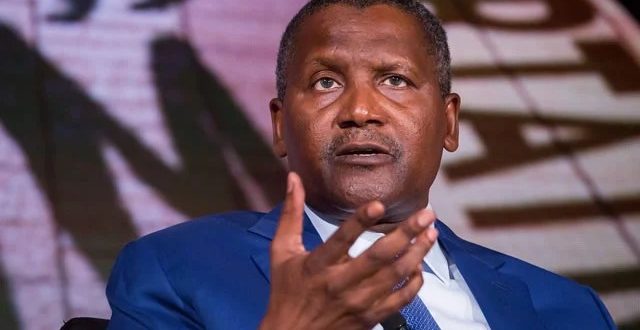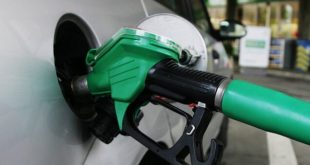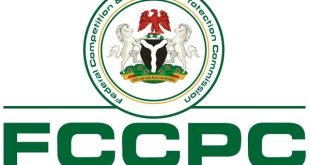Aliko Dangote, founder and President/Chief Executive of the Dangote Group, discusses the operations of his refinery amid ongoing controversy in an interview with Francine Lacqua on Bloomberg.
You now have the refinery. How does it feel?
I think it feels great. It is a great achievement. It’s something that 90% of the world did not give us a chance at. Nobody believed we could pull it off, but we did. And it is a great satisfaction to me personally and also to the organization. So I think we have done very well. When you look at where we are coming from, Nigeria is an oil-producing country, yet we have been importing petroleum products for the last 35 years. It just doesn’t make sense.
From the outside, it looks quite difficult. Is there any regret?
I think no regrets. I would have said that yes, maybe a bit of regret if we hadn’t succeeded in delivering. To tell you the truth, it was a monster. A monster in the sense that what I keep telling people is that if I had known how difficult it was to build this kind of refinery, I wouldn’t have started at all. But by the time we realized it was a very difficult task, we had already started. So we had no choice but to deliver.
But what’s the hardest part? You have a relationship with the government. They are getting rid of subsidies. You have to find the crude, refine it, and sell it back.
I think that is not really the hardest part. The hardest part, I think, is delivering the project. We never expected the kind of challenges that we faced. We launched the project in 2013, and afterward, we had a lot of problems with the state government. It’s not the Federal Government because we have three tiers of government. While we bought land, it was in a state not far from Lagos. And the guy dribbled us for almost three and a half years. We had to move the refinery to Lagos. We got to Lagos, and then we had community issues. It took us really five years to start—just battling here and there after we had already taken loans of about $2.4 billion to start. And interest was accumulating. But we went ahead. Again, the challenges of building that kind of project—we realized we had to build our own port. We built the port, and then we realized that nobody could supply us with cranes or equipment. So we had to do something that people don’t know or realize. We made ourselves the EPC contractor—Engineering, Procurement, and Construction. We did it on our own. And because we had never, ever handled this kind of project before—this kind of project is typically handled by Saipem, Bechtel, or the big players—we took on that challenge. And that is why people believed it would never work.
So the government wants to get rid of subsidies. Will your refinery help with that?
Subsidy is a very sensitive issue. I believe the problem is not only the subsidy. When you subsidize something, people will be inflating the numbers, and the government will end up paying what they are not supposed to pay. But our refinery will bring quite a lot of transparency. It will show the real consumption of Nigeria. Because nobody can tell you. Some people say it’s 60 million liters of gasoline per day; others say it’s less. But right now, with us producing locally, everything can be accounted for. Most of the trucks or ships that will load from us will be tracked to ensure they are taking the oil within Nigeria. I think this can help the government save quite a lot of money.
So do you think it’s the right time to get rid of the subsidies?
I think it is. All countries have actually gotten rid of subsidies. Let me give you an example: Saudi Arabia used to give its citizens the belief that oil is their own God-given gift, so the government shouldn’t charge for it. The government was selling it at a very low price. But today, as we speak, gasoline is about 40% cheaper in Nigeria than in Saudi Arabia, which I think doesn’t make sense. That’s one. Number two, our price of gasoline is about 60% of the price of our neighboring countries. And we have very porous borders, so it is not sustainable. The amount of subsidies that were paid, the government cannot afford them.
Do you need the government to remove the subsidies for your refinery to be viable?
Well, you see, we have a choice: either we produce and export, or we produce and sell locally. But we are a private company. And yes, it’s true, we have to make a profit. We’ve built something worth $20 billion, so we definitely have to make money. The removal of subsidies is totally dependent on the government, not on us. We cannot change the price. But I think the government will have to give up something for something. So, at the end of the day, the subsidy will have to go. What we have done now with the government, and I must really thank the President of Nigeria, President Bola Tinubu, for his very creative idea, is that we will sell the crude to you in Naira, and you also sell in Naira. So now, we are working out the exchange rate. It’s going to be normal pricing. If crude is at $80, we will pay that price, using an agreed exchange rate, and then we will also sell in the domestic market. What that will do is remove 40% of the pressure on the Naira. Petroleum products consume about 40% of our foreign exchange. It’s like you have 40% of demand being taken out, so that can actually stabilize the Naira. Also, even if the government does subsidize, they will know the real consumption, because right now, nobody can tell you what you’re consuming. It’s all guesswork. So that can help in terms of stabilizing the market. It can also help with removing queues. You know, there are a lot of queues, and these queues haven’t just appeared today. They’ve been on and off since 1972, for the last 52 years.
So, what does it mean to deal in Naira instead of dollars? What does it mean for your group? Is it a benefit, or does it just give the government something they want?
I think it’s really about giving the government something they want. It’s a win-win. We are Nigerians, and we also have to do something to show that we care. And part of caring is agreeing with the government to move forward with this, because it would be very awkward for someone like me, or our group, to come and say, “No, we want to deal in dollars.” I think it’s a win-win, and it will benefit the country quite a lot. The whole thing is really about what we leave as a legacy. And I think doing this—and even making sure that we’ve taken Nigeria out of being a petroleum product-importing country for the first time in the history of Nigeria—is a great milestone, which I am very proud of.
So, how is the relationship with the government? I know there have been a number of negotiations, including the price of gasoline. What kind of offers have you made?
I think we have quite a good relationship today with the government. The President actually brought together the Minister of Finance, the Minister of the Coordination of the Economy, and the Special Advisor on Revenue, a very smart guy, Zack Adedeji. They are working out something which I think will be a win-win between us and the NNPC. If the Nigerian National Petroleum Corporation’s refineries start to work, then Nigeria will be one of the biggest exporters of petroleum products in Africa. In Africa, only two countries are self-sufficient in petroleum products, which are Algeria and Libya. All other countries are importers of petroleum products.
So, what kind of agreement are you expecting with the NNPC?
I think the kind of agreement we are expecting is a very robust one, where we will ensure energy security.
Will they give you crude?
They will give us crude. Already, we have agreed that in October, they are going to give us 12 million barrels, which is roughly about 390,000 barrels a day. We will refine it and sell gasoline, diesel, and aviation fuel. If there is any excess, we will export. But, you know, our refinery is also versatile, producing a lot of different products. It’s not only the three things I mentioned. We are also into polypropylene, a petrochemical, and 80% of that is to be exported, while 20% will meet the demand in Nigeria, which we will sell to help plastic industries. With the government, I think the agreement will be that once we take the crude, we will sell to everyone. This means that 50% or 60% of petrol stations that have been out of operation or not functioning properly will now be operational. It will reduce the cost of having ships floating off the coast of Lomé and paying demurrage. On demurrage alone, we are going to save over a billion dollars.
I think there seems to be disagreements on how you price your gasoline with the NNPC. Have you settled on a price? Can you give us a bit more clarity on what’s going on?
It wasn’t a disagreement per se. NNPC bought from us this particular shipment on the 15th of September at the international price, which they also used to buy over 800,000 metric tons of imported gasoline. The gasoline they bought from us is cheaper than the one they are importing. So when they announced our price, it wasn’t really the real price. What they announced is most likely what it cost them, including profit, and whatever else, which they have never added profit to their cost before. The imported gasoline doesn’t have transparency on how much was spent in terms of input, but the imported one is probably 15-20% more expensive than ours. So what they should do is sell at a basket price, or if they want to remove the subsidy, they can announce that the subsidy is removed. That way, everyone will adjust.
But you are not worried that some of the oil majors, because of their vast resources, can sell for cheaper?
Well, yes, most likely, because in business, like I’ve said before, I never knew that the oil industry mafia is stronger than the drug cartel. It’s a big cartel, and I will say this anywhere. The issue is, you are right, they can try to say, “Okay, fine, to make sure that this refinery doesn’t work, we’ll keep selling cheaper.” But right now, they won’t be able to sell cheaper because they will not be able to take local currency. We will take local currency. We have the refining capacity, not only to satisfy Nigeria, but we have refining capacity that is almost twice the consumption of Nigeria.
But you’re also confident that you can strike a deal with the authorities?
We will strike a deal. The president has announced it, and it’s going to start on the 1st of October. So, I think between now and the next couple of days, they will come out with a very clean agreement.
It’s a pretty big accusation saying they (the oil sector) are run like a cartel and they could price you out. What’s your ideal scenario, and how much of the crude would you refine and sell domestically? Like, if you have a blueprint of the kind of agreement that works for you, for NNPC, and for the government, what does it look like?
Well, that agreement will look quite good because we will now have a discussion with the government. We will have one set for the domestic market, where the government will not give anybody dollars to go and buy. We’re going to have a circular economy where all transactions will remain within Nigeria. Bankers, letters of credit, everything will be in Naira. For the crude we export, we also have our own plans to ensure that we don’t fall into the hands of some of these sharks. We have our own plans, and as they are planning, we are also planning because we have to plan to survive, and I’m sure we will.
Does refining Nigerian crude actually shorten the yields for the refinery?
No, it doesn’t shorten the yield. It actually gives a very good yield. But we have to mix different types. Nigerian crude is one; we also use WTI, Brazilian crude, and others. A couple of these, we have to blend. It depends on the LP model. If we do that, we’ll know which one we have in terms of yield. But you know, our refinery is also designed to produce 93% high-value products, including polypropylene, gasoline, diesel, aviation fuel, and very small amounts of naphtha, which will only amount to about 36,000 tons. We also produce raw materials for carbon black. But the low residue, which is the cheapest product, is less than 7%. This makes our refinery a very profitable refinery. But, you know, this is something you build for the long term. It’s not something that pays off quickly. If it were just about making money, we could have taken the same money and invested in stocks of Microsoft, Tesla, and Google over the last seven years. Our worth would have been over a hundred billion dollars.
But you are confident you can make this work. Are you going to invest more in the sector? Why not go upstream?
We are also upstream, though not on a large scale. We have two oil blocks, which we are starting production on this October. But we are focusing more on the downstream. In oil, you can produce over 6,800 items. Right now, we are doing polypropylene, and we’re going to double our production in polypropylene. We will also produce about 500,000 tons of polyethylene. Additionally, we are involved in another company, owned by us, which is producing about 3 million tons of urea. We will also double that. We’re also working on lab benzene, which is a raw material for making detergent. Nobody produces that in Africa. These are the smaller projects we want to pursue, and we aim to achieve this within the next two and a half years.
So you wouldn’t invest in actually getting the oil out of the ground?
Well, I think we don’t want to put too much money there. I already have one. If any cheap asset comes around, we can pick it up. But is it the intention of our group to make sure that we produce our own raw material? We are not going to do that. We will not target producing 300,000 or 400,000 barrels per day. We don’t have that plan as we speak today.
There was confusion. The NNPC was meant to take 20% of the refinery. It’s now 7%. What happened?
I think we agreed with them and gave them a good deal. We structured an agreement. The first agreement was that they were going to pay us $1 billion. The deal was about $2.79 billion, and then the balance of the money, $1 billion, was paid to us about a year and a half ago. The balance of the money was split into two portions. One portion was for every crude they supply to us, 300,000 barrels, from which we would deduct $2 until they finish paying that one third. The other third would come out of their own profit. So, what NNPC opted out of was the arrangement. There was a bit of confusion, and they wanted this agreement changed to one where they would pay cash. They didn’t want to do it that way. So, we said okay, and signed another agreement, canceling the first one. The new agreement we signed was for them to pay us the balance of $1.8 billion after one year, with no interest. The month for them to pay was June, but in June they came back and said they had changed their minds. They wanted to remain at 7.2%. So, okay, fine. We left it at that. They own 7.2% of the shares, and we own the rest. That’s where we are now. But I think they made a big mistake.
But it’ll stay that way? There’s no negotiation or talks for them to increase?
There is no negotiation. The agreement is finished, dead, and completed at 7.2%. That’s where we are right now.
Why was your office raided in January?
Well, the issue is that there was nothing. They came to us and said they were looking for some documents. I asked, “What are these documents?” They said, “You are bidding in terms of foreign exchange.” I said, “Okay, we have this, but you’re asking for 15 years’ worth of documents.” By the way, we had them. So we sent people out there to get the documents. But they said, “No, go back. We are going to come to your office.” Before we knew it, they were already in our office. The office wasn’t actually raided; they just visited. They didn’t talk to anybody or arrest anyone. They just came and left, just to create an embarrassment. That’s all. But the way we run our organization is why, when you look at it, Francine, we are the highest tax-paying corporation in Nigeria. Our company paid more in taxes in 2023 than the entire banking industry. And that is why, whatever we do, we know we are up there. Anybody, whether it’s a new government or whatever happens, we are the first point of call. That’s why our behavior has to be 100% clean.
And that’s settled?
Yes, it’s settled. And if anyone wants to ask us about our tax, or anything else, we don’t have any issue with that. People really don’t understand what we contribute to the economy. But in a very short period of time, people will understand our contributions.
The fertilizer plant is only at what, 50% of capacity?
It was at 50% capacity, but in the last month or so, we’ve had enough gas. So we’ve started running at about 85%. I hope it continues. But there’s also the OB3 gas pipeline, which is bringing gas from the east to the west. The west has industries, so that’s where the demand is. In the east, the gas is there, but there’s no demand. If they finish the pipeline, which they promised to complete in October, then we will have more gas than we need. I think that issue is being resolved. That’s why we’re also investing more by building another plant to double our fertilizer production from 3 million to 6 million tons.
So the refinery is built and you are one of the biggest Arsenal fans I know. Do you still want to buy the club?
Francine, I think that time has passed. The last time we had this interview, I told you that, yes, as soon as I finished with the refinery, I was going to try and buy Arsenal. But the issue is that everything has gone up. The clubs, too, are all doing very well. Arsenal is doing extremely well now. At that time, Arsenal wasn’t doing well. I don’t have that kind of excess liquidity to go and buy a club for $4 billion, so to speak, and use it as a promotional thing. I would rather do something else with the money. What I will do is continue to be the biggest fan of Arsenal. I watch their games every day. Anytime they are playing, I watch. So I will remain a major supporter of Arsenal, but I don’t think it makes sense today to buy the club.
Do you regret not buying it before, last time we spoke?
Actually, I regret not buying it before. But my money was more needed in completing my project than buying Arsenal.
So you would have bought it for $2 billion?
I would have bought it (Arsenal Club) for $2 billion, but I wouldn’t have been able to finish my project. So it was either to finish the project or go and buy Arsenal. And I think the best decision was to complete our refinery, which a lot of people didn’t believe would work. You remember you interviewed me about this refinery, and now our refinery has become a talking point all over the world because our capacity is about 1.1% of the entire global refining capacity.
Not without challenges?
It was a lot of challenges, a lot.
But would you do it all over again?
I wouldn’t do this kind of huge refinery project again. You can see, I told somebody that doing this refinery is what actually gave me my gray hair.
 National Telescope national telescope newspaper
National Telescope national telescope newspaper



